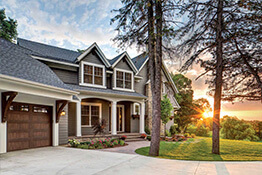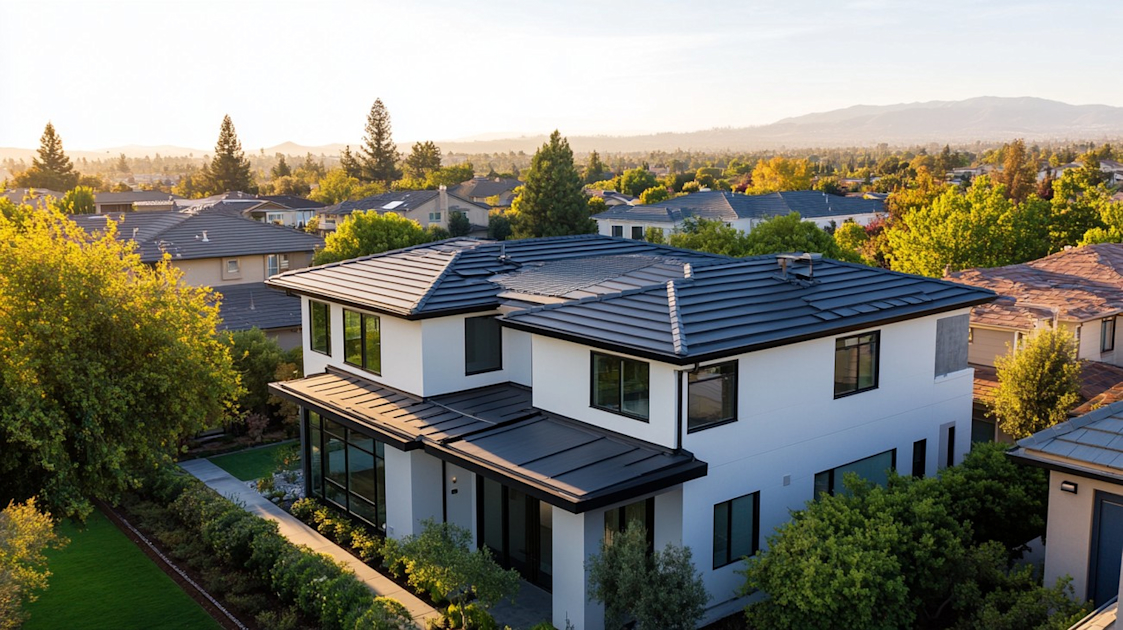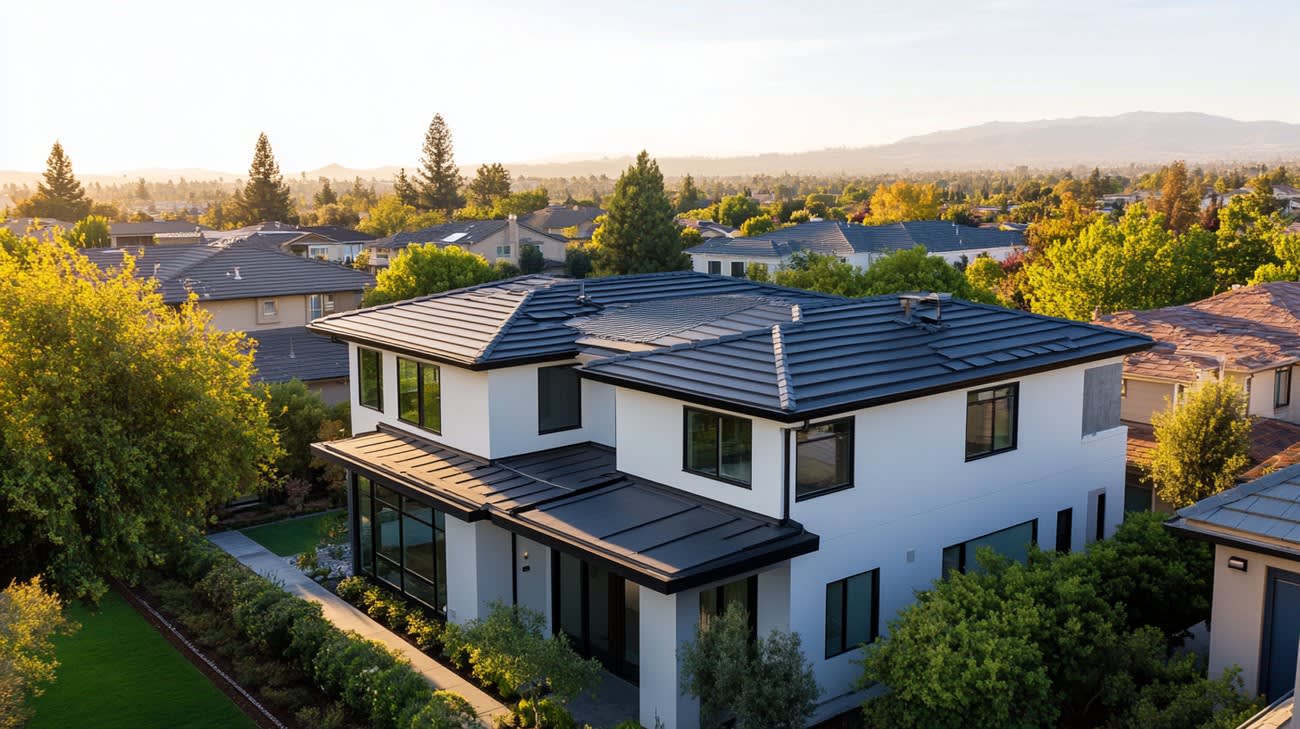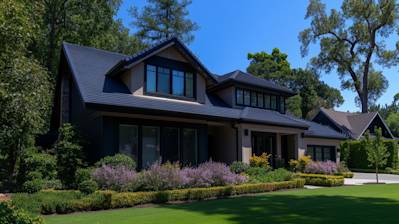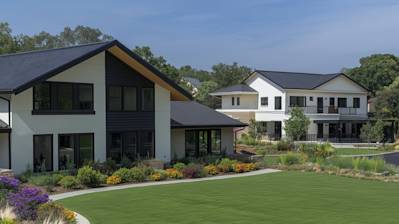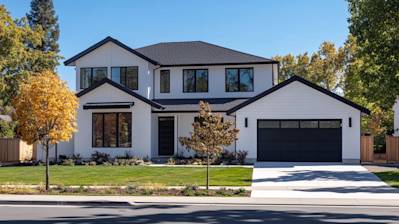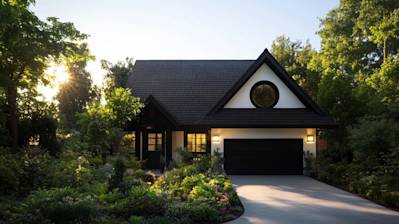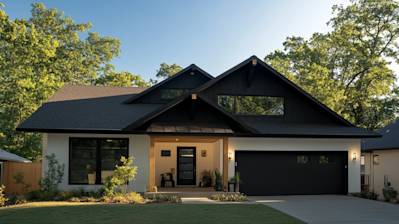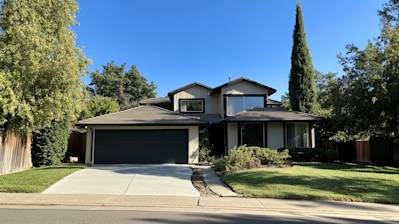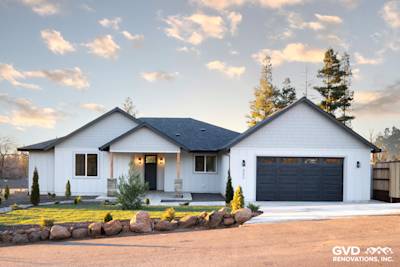A flat roof is an excellent choice for many homeowners and business owners. Not only does it provide a unique aesthetic appeal, but a well-maintained flat roof can effectively protect against the elements, making it a cost-effective and practical solution. One of the critical factors determining the lifespan and performance of a flat roof is, of course, the roofing material. In this blog post, we will delve into the comprehensive guide on flat roof materials.
Explaining Flat Roof Materials
Flat roof materials encompass all the essential products and components used to construct a flat roof. This might involve roofing membranes, underlays, and other necessary compositions.
Major Types of Flat Roof Materials
There are various types of materials to choose from when building or renovating a flat roof. Below, we'll compare the most popular flat roof materials.
Built-Up Roofing (BUR)
Built-Up Roofing, often abbreviated as BUR, is one of the oldest and most reliable flat roof materials. It involves a multi-layered installation process that ensures excellent waterproof capabilities and durability.
Modified Bitumen
Modified Bitumen roofing system is another common choice for flat roofs, famous for its strength and longevity. It combines asphalt and rubber-like components to make it strong and stretchable.
EPDM Rubber
The Ethylene Propylene Diene Monomer (EPDM) rubber is an incredibly durable roofing material with a lifespan of up to 50 years. It is often chosen for its durability, simplicity in installation, and overall value for money.
TPO and PVC
TPO (Thermoplastic Olefin) and PVC (Polyvinyl Chloride) are synthetic roofing materials that offer excellent longevity and a higher resistance to temperatures, UV rays, and chemical exposure.
Asphalt
Asphalt flat roofing is a traditional and respected choice recognized for its maintenance simplicity and multi-purpose performance.
Determining the Best Flat Roof Materials
Durability: Ensure the material can withstand different climates and can hold up well over time.
Installation: Consider how easy it is to install. Some flat roof materials are more labor-intensive than others.
Price: Roof materials come at different prices. Always balance cost with quality for long-term savings.
Sustainability: More and more homeowners are looking for roof materials that are environmentally friendly.
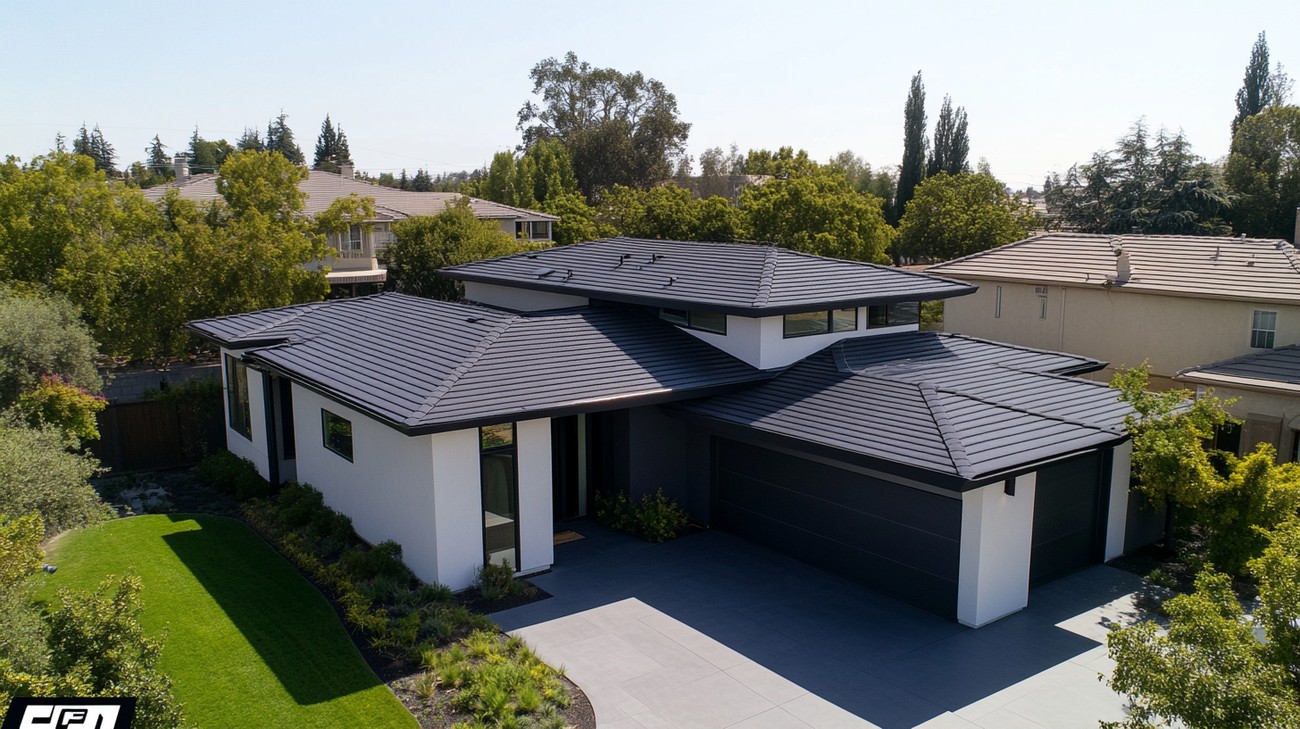
Frequently Asked Questions about Flat Roof Materials
How Are Flat Roof Materials Chosen for Specific Projects?
The selection of flat roof materials largely depends on factors such as geographic location, local climate, the structure of the building, and the estimated budget for the roofing project. Other factors to consider are the lifespan of the material, installation process, and the material’s resistance to elements such as wind, rain, snow, fire, and UV radiation.
Can Flat Roof Materials be Recycled or Are They Environmentally Damaging?
This largely depends on the type of flat roof material used. For instance, PVC roofing materials are often recyclable, and some manufacturers take back and recycle their used roofing membranes. On the other hand, other materials like modified bitumen may not be as friendly to the environment. Hence, if you are looking for more sustainable options, it's advisable to consult with roofing professionals to guide you in making an environmentally-friendly choice.
What Are The Lifespans of Different Flat Roof Materials?
Flat roof materials have varying lifespans, which largely depend on factors such as installation quality, the local climate, and maintenance frequency. On average, EPDM Rubber roofs can last around 10 to 15 years, TPO and PVC roofs can last 15 to 20 years, Modified Bitumen roofs have a lifespan of 10 to 20 years, Built-Up Roofs can endure for 15 to 30 years, and Spray Polyurethane Foam roofs can last over 50 years with proper maintenance.
How Much Do Flat Roof Materials Typically Cost?
The cost of flat roof materials can greatly vary depending on the type of material and the specific brand. On average, EPDM Rubber costs approximately $0.4 per square foot, TPO and PVC cost around $0.6 to $1.5 per square foot, Modified Bitumen costs approximately $1 to $2 per square foot, Built-Up Roofs can cost around $2.50 to $5.00 per square foot, and Spray Polyurethane Foam tends to cost between $1.50 and $3.00 per square foot.
Do All Flat Roof Materials Require Professional Installation?
While some flat roof materials can be installed as DIY projects, many require professional installation to ensure they are installed correctly and safely, and to uphold their warranty. Materials like EPDM Rubber can be relatively easy to install, while others like Spray Polyurethane Foam or Built-Up Roofs require specific equipment and professional expertise. As such, it's always recommended to consult with or hire a roofing professional.
Which Flat Roof Materials Are the Most Resistant to Weather Conditions?
This will depend on the specific weather conditions prevalent in your region. For instance, EPDM Rubber handles cold better than other materials, while PVC does well in areas getting high acid rain due to its chemical resistance. On the other hand, TPO can be a better choice for hotter climates as it reflects UV rays rather than absorbing them.
What Maintenance is Required for Flat Roof Materials?
Regular maintenance is crucial for prolonging the lifespan of any roof, regardless of materials used. This includes regular inspections, prompt repairs of any damage or leaks, keeping the roof clear of debris, time to time re-coating (in case of SPF roofs), and ensuring proper drainage to avoid water pooling.
What Should be Considered When Purchasing Flat Roof Materials?
When deciding on which flat roof materials to purchase, consider factors such as the product's lifespan, weather resistance, the environment, installation process, warranty, and of course, your budget. It's also advisable to consult with a roofing professional before making your decision.

Pros of Flat Roof Materials
Longevity
Flat roof materials, if installed correctly and maintained regularly, can last anywhere between 10 to 50 years, making them a worthwhile investment. The lifespan of these materials also depends on the quality of installation and environmental factors, so ensuring a professional installation is important.
Bitumen
Modified bitumen, in particular, has a life span of around 10 to 20 years, offering a durable solution against harsh weather conditions.
PVC Roofing
PVC roofing material is known to last 20 years or more. In some cases, they can even last up to 50 years with excellent performance in the face of severe weather conditions. This makes them an ideal long-term solution for flat roofing applications.
Durability
Flat roofing materials are designed to withstand significant wear and tear. This makes them ideal for regions with variable weather patterns, as they can handle precipitation and temperature changes, as well as considerable wind forces.
Rubber Membrane
The durability of rubber membrane roofing, also known as EPDM, is notable. It's resistant to hail and UV radiation, both of which can pose significant threats to roofs.
TPO Roofing
TPO roofing systems, made of thermoplastic olefins, are highly resistant to punctures and impacts. This durability means a lower chance of needing significant repair work post-installation.
Energy efficiency
Many flat roofing materials have energy-efficient properties. Certain materials offer excellent solar reflectivity which can help to keep the building cool, reducing energy use for air conditioning.
PVC Roofing
PVC roofing has a high solar reflectivity value, which means less heat is absorbed into the building reducing cooling costs, particularly in warm areas.
TPO Roofing
TPO roofing is similarly energy-efficient, with both lighter and darker colors available to suit any climate.
Cons of Flat Roof Materials
Costs
Though flat roofing materials offer longevity, their initial installation cost can be high compared to other roofing solutions.
Rubber Membrane
For instance, the cost of rubber membrane roofing can be quite high compared to other choices, particularly if reinforced with high-quality materials.
Bitumen
While modified bitumen roofing is a reliable and durable option, it also often comes with a higher price tag due to labor-intensive installation.
Maintenance
While flat roofs require less maintenance in comparison to sloped ones, when damages occur, they can be more difficult to repair as leaks and water pooling are common issues with flat roofs.
EPDM
Rubber membrane or EPDM roofing may require additional maintenance and inspection due to its susceptibility to punctures and seam weaknesses.
Weather Resistance
Flat roofs may struggle with heavy rainfall or snowfall as water may pool up and influence the durability of the material.
Bitumen
In particular, modified bitumen roofing, while durable, is not completely impervious to all types of weather and can suffer from water damages if not properly installed.
TPO Roofing
TPO roofing, while generally resistant to weather, can be susceptible to seam weakening after heavy snowfalls or rains, making it necessary to assess and repair as needed.

Myths and Misconceptions About Flat Roof Materials
In the world of roofing, there are a variety of materials to choose from, especially when it comes to flat roofs. However, many misconceptions may emerge over time, clouding both homeowners and builders' understanding of these materials. This article aims to debunk some of the most prevalent myths and misconceptions about flat roof materials.
Myth 1: All Flat Roof Materials are the Same
Flat vs. Low Slope
This misconception arises from the confusion between flat roofs and low slope roofs. In reality, flat roofs are almost never perfectly flat, but instead have a slight pitch for water drainage. Different materials perform better on truly flat or low slope roofs, and it's essential to choose the appropriate material for the roof's slope.
Performance Variation
Different flat roof materials have varying levels of durability, longevity, and resistance to elements like UV radiation, wind, and ice. For instance, EPDM (ethylene propylene diene monomer) rubber roofing tends to be more resilient and durable than rolled asphalt roofing.
Myth 2: Flat Roofs Always Leak
Many people mistakenly think that because of the lack of slope, all flat roofs are predisposed to leak. While flat roofs can be prone to pooled water, a well-installed flat roof constructed with high-quality materials should not have issues with leaks.
Myth 3: Flat Roof Materials are Only Suitable for Commercial Buildings
Although it's true that flat roofs are common in commercial and industrial buildings, they are not exclusive to these applications. Flat roofs can also be seen in residential buildings. Some homeowners prefer flat roofs because of their modern appeal and potential for added living space like rooftop patios.
Myth 4: Flat Roof Materials are Too Expensive
The notion that all types of flat roof materials are excessively costly is a sweeping generalization. Some materials like PVC and metal may be expensive due to their durability and longevity. However, other flat roof materials like rolled asphalt and EPDM are relatively cost-effective, offering homeowners and builders an affordable yet reliable roofing solution.
Myth 5: Flat Roofs are Impossible to Maintain
All types of roofs require regular maintenance to stay in good shape, and flat roofs are no exception. Maintenance methods will usually depend on the roofing material used. For example, EPDM roofs may require regular seam treatments to prevent leaks, while a modified bitumen roof might need regular surface coatings to protect against UV radiation. With regular maintenance, flat roofs can last as long or longer than other roof types.
Myth 6: Flat Roofs Have Unfit Weight Load
A common misconception about flat roofs is that they cannot support weight loads as traditional pitched roofs can. This belief is misguided as flat roofs, when constructed correctly, can support various loads including solar panels, HVAC units and even roof-top gardens.
Myth 7: Flat Roofs are Bad Insulators
With proper insulation, flat roofs can be as energy efficient as other types of roofs. The key lies in choosing the correct insulation, ensuring its compatible with the roofing material chosen.
In conclusion, while there are a number of misconceptions surrounding flat roof materials, most of these myths stem from a lack of understanding. With appropriate installation and maintenance, flat roofs, no matter what type of material, can serve as a reliable, durable and aesthetic roofing solution.
Summary
So, have you considered which of the flat roof materials best suits your needs? Materials such as bitumen, rubber, and PVC each have their own unique benefits that can make them an ideal choice for your property. Bitumen and rubber, for instance, are great for areas with adverse weather conditions since they provide excellent waterproofing and durability. On the other hand, PVC offers a chemically resistant and environmentally friendly option that caters to more specialized needs.
Evidently, the selection of flat roof materials greatly impacts the longevity and performance of the roof. By considering factors like climate, the building's structure, and your budget, you can identify the right material for your property. With the right choice, you can enjoy significant cost savings in the long run through reduced maintenance and repair costs.
That wraps up our dive into flat roof materials. This knowledge goes a long way in helping homeowners make informed decisions that ensure the durability and stability of their properties. Whether you're planning a new building project or considering a roof replacement, remember that each roofing material offers unique advantages to make your investment worthwhile.
About GVD Renovations & Remodeling
GVD Renovations & Remodeling is a renowned and respected home renovation company based in Roseville, CA. Boasting several years of experience and a wholehearted commitment to providing top-grade services, we deliver comprehensive solutions for all kinds of renovation needs. Whether it's exterior, interior, or full home renovations you need, we've got you completely covered. Our team of experts are trained and certified, and use the most cutting-edge tools and techniques in the industry. At GVD Renovations & Remodeling, we pride ourselves in offering unparalleled customer service, ensuring that all your renovation projects are completed to the highest possible standard. Experience the GVD difference today—renovations have never been this easy or this enjoyable!
Tags: - roofing materials, flat roof, building materials,

